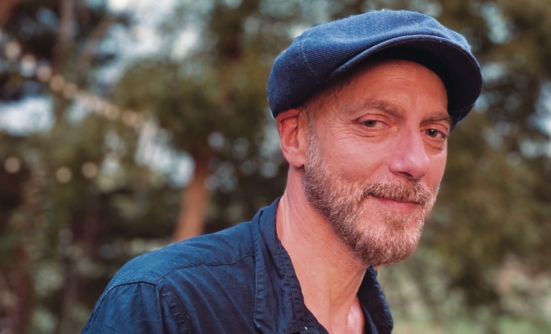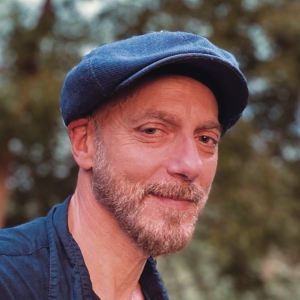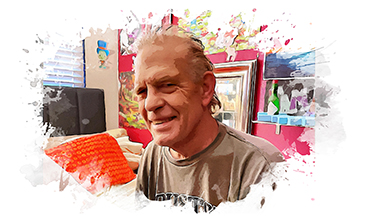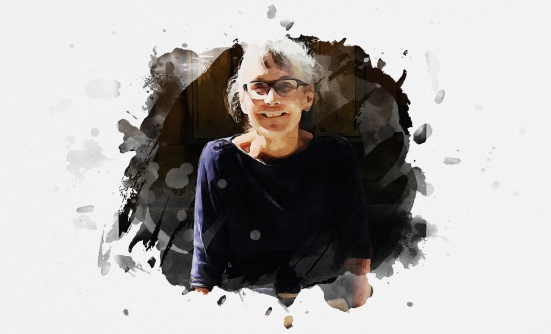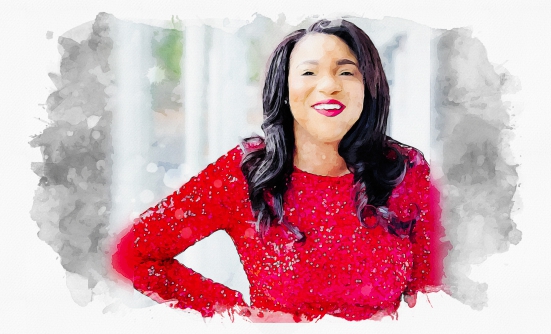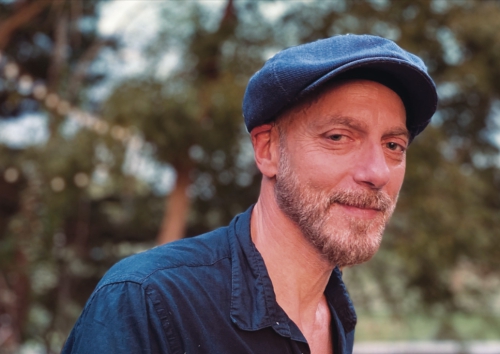
I’ve spent my professional career as a singer-songwriter, played at clubs in the United States, and toured in Europe throughout the 1990s. In 1994, I even had a number one record in Italy. I’ve loved music as a child and still love it just as much as when I had first picked up the guitar. Fast-forward 2 decades, in my late fifties I was hiking in the mountains, playing music, and just enjoying my life.
A Feverish Start, a Blood Clot
Shortly after I turned 60, I got a fever that wouldn’t go away. I started losing weight and feeling nauseous, which I had never experienced before. I was popping Dramamine like candy, and my doctors kept misdiagnosing me. To be fair, I didn’t have any symptoms that would have led anyone to suspect the problem was in my lungs.
At first, they thought I had Lyme disease, then they focused on my gallbladder, because of a minuscule elevation in a blood test. The fever continued 24 hours a day. Somehow, I dealt with these symptoms, while desperately seeking a solution. Cancer never entered my mind. Then I had a large and painful blood clot in my neck, which was a harbinger of something ominous.
I went to the emergency room, where a doctor prescribed a blood thinner medication, and I went home thinking: I’m getting older; blood thinner isn’t so bad. Four days later, I woke up and took a deep breath, and had pain in my upper chest, a type of pain I had never felt before.
I Googled the symptoms of a blood clot in the neck, and among all the medical reasons, the word “cancer” jumped out at me. I don’t know if it was fear or simply that I’d never felt any pain like it, but I immediately called my sister, who happened to be on vacation. At that point, I was running on fumes, and told her that I thought I had lung cancer. She remembers the date perfectly. It was July 13, 2018.
I went back to the emergency room, the doctor said to do a chest x-ray. When he saw the results, he came back and said he saw “a mass,” and I should see an oncologist immediately. I had already made an appointment because of the blood clot.
More tests and scans showed that I had stage IV non–small-cell lung cancer, or NSCLC, the most common type of lung cancer, which had spread to my brain, bones, and lymph nodes. Who expects to get cancer? I certainly didn’t!
I knew that stage IV meant metastatic cancer, which was bad, but I didn’t want to know how much time I had left. With my personality, it wouldn’t have been helpful for me to know how dire my situation was. I would have dwelt on it obsessively. Instead, I started treatment, and tried to stay in the present.
Trial, Error, and Gratitude
After a 3-week trial-and-error period, I started treatment with 2 chemotherapy drugs—pemetrexed plus carboplatin—that were considered the “gold standard” for NSCLC at the time. I still had fever and was very weak. After about 4 weeks of chemo, I had a serious infection and was admitted to the hospital.
My fever was 104 and 105 degrees every day. After 5 weeks in the hospital, the doctors finally found something that killed the infection. To this day, they don’t know exactly what that infection was, but I owe a great debt to the infectious disease specialist, who searched tirelessly for a solution.
In the hospital, I was so delirious that I never thought I wouldn’t survive. A few terrible nights I thought of death as a release. But so many people from all parts of my life came to visit me. I now know that many were coming to say goodbye. The outpouring of love was so beautiful.
Despite how sick the chemo made me, all my tumors started to shrink. When I finally left the hospital, my caregivers and I decided that we had to find a new oncologist. My 2 main caregivers were my ex-wife, Patricia, and my sister, Alix. Without them, I don’t think I’d be here today. You need people, and you need help.
My ex-wife has been a professional photo researcher, so she knows how to research. She found a great local oncologist for me. My gratitude cannot be put into words. Together with her husband Peter, they generously took me into their home when I was still very ill and couldn’t do much for myself. Love is love, and I’ll never forget how lucky I was and still am for their support. And I don’t think I would have survived without my sister either. She was my emotional rock and stayed with me all through the initial crisis.
A Miracle
My new oncologist suggested we stop the chemotherapy. Tests showed that I had a high level of the PD-L1 marker, which meant I was a good candidate for immunotherapy that blocks the PD-1 or PD-L1. So I started treatment with Keytruda by IV infusion every 3 weeks, for 26 months.
After the first year of immunotherapy with Keytruda, the tumors throughout my body began shrinking and disappearing, even the tumors in my brain; Keytruda can cross the blood–brain barrier. I also had stereotactic radiation to remove the largest tumor near the occipital lobe in my brain. It zapped that tumor completely. My recovery was a miracle.
It’s now been almost a year since I stopped treatment. The tests keep showing no evidence of cancer. That does not mean that there is not a small malignant cell hiding somewhere in my body, but so far, every CT scan has been normal.
These days, I’m swimming, hiking, walking, and playing music again. I’m eating right and trying to put some weight back on my thin frame. My doctor told me to go out and live my life.
Obliterating Self-Obsession
Having cancer led me to read more on Buddhist philosophy: the acceptance of impermanence, the temporary nature of all things, and how naturally delicate and frail we are. These readings have made me feel a part of a great flowing river of life. I surrendered to what was out of my control, while doing everything in my control to survive. It was a surrender to be more at peace with myself. I’m not a Buddhist, but I found these ideas comforting.
It’s funny how the ego shows up, even when dealing with cancer. When I got sick, I didn’t want to tell anyone I had cancer; I didn’t want to be “Josh, the cancer guy,” when I’d walk into a room. But when I was surrounded by my family and friends, the love they gave me surprised and transformed me.
I only realized the immense importance of eliminating self-obsession when I was diagnosed with cancer. Once I accepted who I was in this experience of having cancer, that was the breakthrough. There wasn’t some perfect Josh I had to be. I was just the person I was at that moment. It was a relief to be vulnerable. I knew there was a very real possibility I wouldn’t survive, and it helped to talk about my fears honestly.
Once I made that transformation into self-acceptance, I could express gratitude and love in a much more real and deeper way than before. We often say we love our friends, but we don’t mean it; it’s a halfway kind of friendship, without a lot of depth or substance. When I was able to take down this emotional house of cards, I opened up to feeling immense gratitude for having all these people I loved, so close.
One of my best friends said to me, “I’ve never seen somebody so cured of their neuroses from getting cancer!”
Existential Anxiety
I am not immune to feeling the dread and sadness about dying from cancer—what researchers at Johns Hopkins call “existential anxiety.”1 When you have had cancer, you always carry this anxiety with you.
Every time I have a CT scan, I wonder if this is the time I will have to restart treatment. If I tell my friends that I’m terrified, they tell me that I’m negative. But I’m not a negative person. The fear of relapse is a natural part of having cancer.
As it turned out, Johns Hopkins was enrolling patients with cancer in a clinical trial to take the psychedelic drug psilocybin to help patients explore those feelings of anxiety and potentially gain new insights, or develop ways to cope with those feelings.1 I didn’t want to live my life hysterically. Instead, I wanted to lean into the anxiety and draw out the truth of what cancer had to teach me. So, about a year ago, I joined that clinical trial.
When I was tripping, I had the experience of being buried, coming in and out of the ground. I had a revelation that my life was just a small fraction in the long stream of existence, and that there would be no value in just fearing death. Having that experience didn’t rid me of existential anxiety, but it did help me to feel freer and more accepting of this wider canvas of life and death.
Sometimes when I’m doing something, I wonder if it’s the last time I’ll be doing that thing. I’m not traumatized because my mortality could come sooner than expected. Many healthy people ram through life never internalizing the idea of time, never considering their finite time of being alive.
After my diagnosis, I’ve lost the illusion that I have “forever” to do whatever I want to do on planet Earth.
Self-Acceptance
I savor the moments and the experiences of being fully human. At the same time, every minute of every day does not have to be an epic moment. For me, sometimes it’s just taking a walk or hiking up a mountain near home. Maybe it’s just looking over a mountain’s edge. Gratitude lies underneath it all: I find myself being more present than I was before.
Six months ago, I was writing some songs, and I had a crisis: I asked myself why I was writing. I’m no Mozart or Townes Van Zandt—a great teller of metaphor and story in song. I’m not changing the world with my songs. But to quote one of my favorite Tom Petty lyrics, “Think of me what you will, I’ve got a little space to fill.” It’s not the external validation or acclaim that is important, but being honest with yourself, wherever you are.
This goes back to the discovery I had at the beginning of my cancer journey of self-acceptance: If I can love and be honest, as a musician and as a human, I’ll have lived a good life.
Reference
- Johns Hopkins Medicine. Psilocybin treatment for major depression effective for up to a year for most patients, study shows. February 15, 2022. https://bit.ly/3vSVclX.





